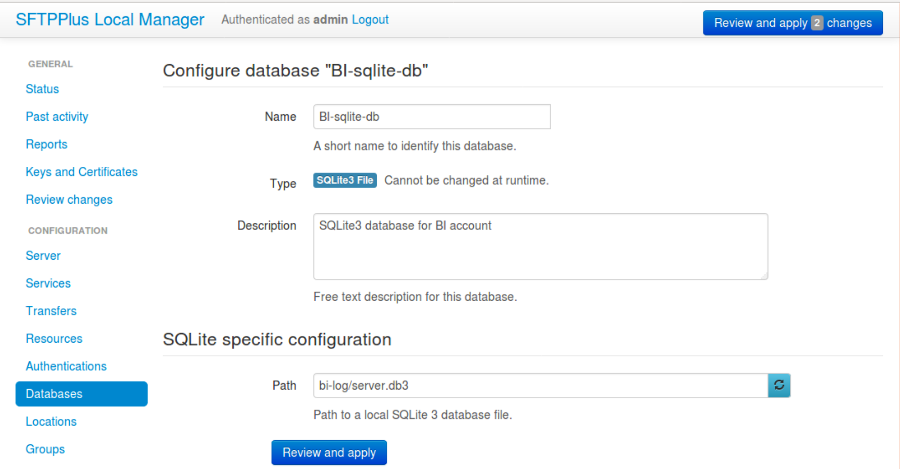SFTPPlus Documentation
4.8. Databases¶
SFTPPlus can interact with databases in order to perform data related operations, such as storing audit trails, activity reports, etc.
Supported databases:
- MySQL
- SQLite
The same database can be shared for different server operations. For example, you can use the same database for audit trail and activity reports. You can also use separate databases if you want.
When a database is stopped, all components depending on that database are paused.
4.8.1. Adding a new database via Local Manager¶
A new database can be added or changed via Local Manager below.

4.8.2. Adding a new database via text configuration¶
Adding a new database configuration is done by creating a new section inside the configuration file. The name of the section should be prefixed with databases/ and followed by the database’s UUID.
The database’s UUID can be any unique string used to identify the database. Once defined, the UUID should not be changed.
For more information, see the dedicated UUID documentation.
For example, to add a new database configuration for a sqlite database called Staging SQLite:
[databases/a904e3a6-a59b-4bbf-8abd-edcae4d3324f]
name = Staging SQLite
description = SQLite file used for testing.
type = sqlite
path = path/to/sqlite/file.db3
4.8.3. Generic database options¶
While additional options are available (depending on the database type), each database configuration section has the following standard configuration options:
4.8.3.1. name¶
| Default value: | ‘’ |
|---|---|
| Optional: | No |
| From version: | 2.6.0 |
| Values: |
|
| Description: | Human-readable short string used to identify this database. |
4.8.3.2. description¶
| Default value: | ‘’ |
|---|---|
| Optional: | Yes |
| From version: | 2.6.0 |
| Values: |
|
| Description: | Human-readable text that describes the purpose of this database. |
4.8.3.3. type¶
| Default value: | ‘’ |
|---|---|
| Optional: | No |
| From version: | 2.6.0 |
| Values: |
|
| Description: | This option specifies the type of the database. |
4.8.4. SQLite 3 local database file¶
To configure an SQLite 3 local database file, use the type sqlite.
The configured database requires read/write and table creation permissions, which for SQLite translates into read/write permissions to the database file for the account under which the server is running.
If the database file is not present, the server will try to create it. It will not create its folder if it does not exists.
The tables are automatically created when the connection is initiated for the first time.
4.8.4.1. path¶
| Default value: | Disabled |
|---|---|
| Optional: | Yes |
| Values: |
|
| From version: | 2.6.0 |
| To version: | None |
| Description: | Path to the SQLite 3 database file. |
4.8.5. MySQL Server¶
To configure a MySQL database server, use the type mysql.
The tables are automatically created and do not need to be explicitly created.
The account used for running the server requires read/write and table creation permissions for the configured database.
4.8.5.1. address¶
| Default value: | 127.0.0.1 |
|---|---|
| Optional: | Yes |
| From version: | 2.6.0 |
| Values: |
|
| Description: | This option specifies the IP address or the host name of the remote MySQL server. |
4.8.5.2. port¶
| Default value: | 3306 |
|---|---|
| Optional: | Yes |
| From version: | 2.6.0 |
| Values: |
|
| Description: | This option specifies the IP port of the remote MySQL server. |
4.8.5.3. username¶
| Default value: | ‘’ |
|---|---|
| Optional: | No |
| Values: |
|
| From version: | 2.6.0 |
| To version: | None |
| Description: | MySQL username used to connect to the MySQL Server. |
4.8.5.4. password¶
| Default value: | ‘’ |
|---|---|
| Optional: | No |
| Values: |
|
| From version: | 2.6.0 |
| To version: | None |
| Description: | MySQL password used to connect to the MySQL Server. |
4.8.5.5. database¶
| Default value: | ‘’ |
|---|---|
| Optional: | No |
| Values: |
|
| From version: | 2.6.0 |
| To version: | None |
| Description: | Name of the MySQL database dedicated to this SFTPPlus instance. |